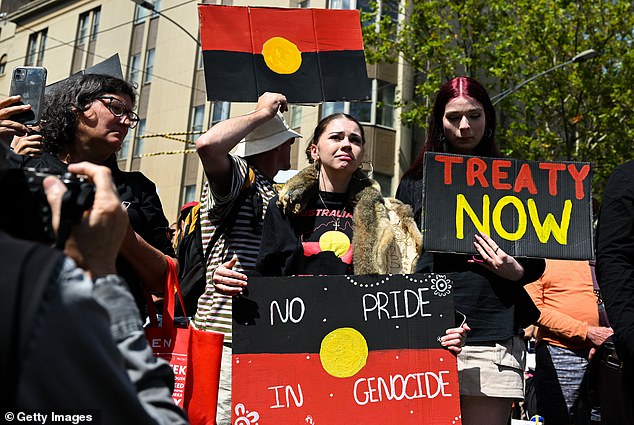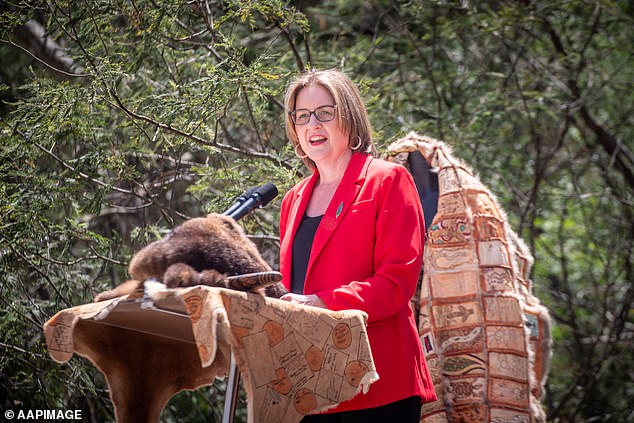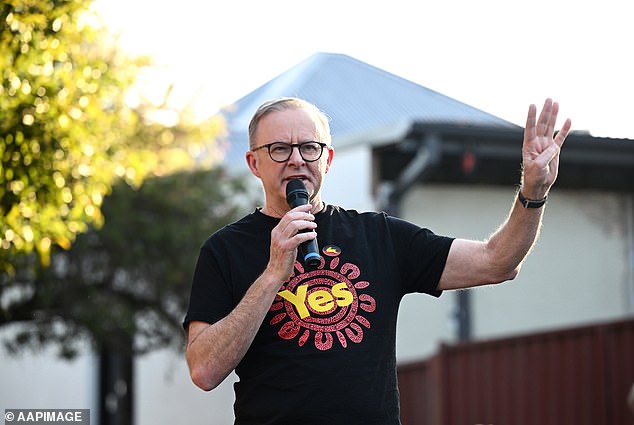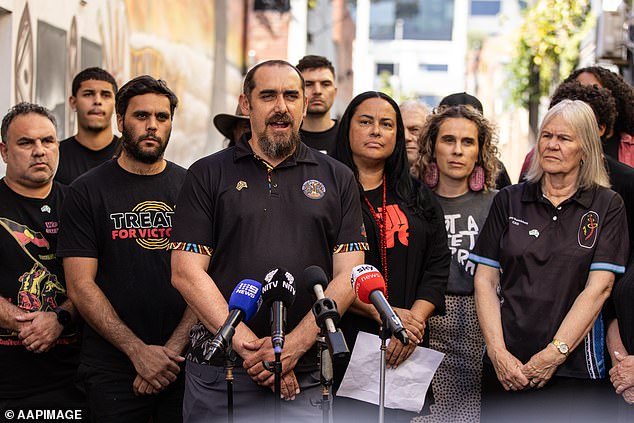Funding a permanent First Peoples’ Assembly which has been compared to the failed federal Voice to Parliament will have cost one state’s taxpayers $280million by the end of the decade.
The Victorian government’s Statewide Treaty Bill will see the Indigenous-elected body receive more than $70million in annual funding from 2027, with that figure eventually to increase by 2.5 per cent each year.
An existing First Peoples’ Assembly is set to be incorporated into an organisation which will have unprecedent powers and be called Gellung Warl – meaning ‘tip of the spear’.
It has been estimated the successive Labor governments of Dan Andrews and Jacinta Allan have already spent at least $380million on negotiating a treaty with Indigenous Victorians since 2016.
With the next five years of proposed funding and $36.8million allocated for capital costs between 2026 and 2029, total spending on the treaty and Gellung Warl will have hit $660million by 2030.
The Victorian legislation will mark the first formal treaty between an Australian state and traditional owners since colonisation began in 1788.
Gellung Warl will have the power to scrutinise government programs and make representations to both houses of parliament, state cabinet, departmental secretaries and individual MPs.
Representatives will attend confidential cabinet meetings at least twice yearly, and the assembly will be able to conduct briefings with Victoria Police’s chief commissioner.

Funding a permanent First Peoples’ Assembly which has been compared to the failed federal Voice to Parliament will have cost one state’s taxpayers $280million by the end of the decade

It has been estimated the Labor governments of Dan Andrews and Jacinta Allan (above) have spent at least $380million on negotiating a treaty with Indigenous Victorians since 2016
Gellung Warl will have no power to veto policy or legislation, much like a state-based version of the Voice.
The Voice was rejected by 60.06 per cent of Australians and 54.15 per cent of Victorians – the lowest percentage of any state – who voted in the October 2023 referendum.
At the last census, taken in 2021, just 66,000 Victorians – or 1 per cent of the state’s population of 6.5 million citizens – identified as Aboriginal and/or Torres Strait Islander.
That figure was up from 0.8 per cent in 2016 and 0.7 per cent in 2011 but still less than a third of the Australian total of 3.2 per cent in 2021.
The local government areas with the largest Aboriginal and Torres Straight Islander populations were Geelong, Greater Bendigo and Greater Shepparton.
The Statewide Treaty Bill will allocate $3million for Gellung Warl’s establishment and operating costs this financial year.
That funding will rise to $23.8million in 2026-2027, $71million in 2027-2028, $72.2million in 2028-2029, then $74million once the annual 2.5 per cent increase kicks in.
That annual increase cannot be altered without a change to the legislation.

The Voice was rejected by 60.06 per cent of Australians and 54.15 per cent of Victorians who voted in the 2023 referendum. Prime Minister Anthony Albanese is pictured in a ‘Yes’ T-shirt
If the Statewide Treaty Bill is passed, as expected, all future Victorian legislation will include a Statement of Treaty Compatibility.
That statement will address whether a proposed law took into account ‘the unacceptable disadvantage inflicted on First Peoples by the historic wrongs and ongoing injustices of colonisation’.
As with other Victorian statutory bodies, Gellung Warl will be subject to oversight from the state’s Independent Broad-based Anti-corruption Commission and the Auditor-General’s Office.
The aims of the treaty are set out in a lengthy preamble to the bill.
‘The historic wrongs and ongoing injustice of colonisation have resulted in unacceptable levels of discrimination, disadvantage and intergenerational trauma for First Peoples,’ it states.
‘These acts of injustice must not continue or be repeated. The State of Victoria commits to not repeating past injustices.
‘Past and existing laws have not been able to fully recognise the inherent rights of First Peoples or address disadvantage and trauma.
‘It is acknowledged that since colonisation Traditional Owners of Country in Victoria have fought for and won back some of the rights and status they hold under Aboriginal Lore and Law.

First Peoples’ Assembly of Victoria co-chair Rueben Berg talks to media during a press conference in Melbourne in January this year
‘These rights have been shaped by First Peoples’ Ancestors and are a foundational pillar in the ongoing journey to self-determination.’
Deputy Premier Ben Carroll told the Herald Sun on Monday that Aboriginal Australians had endured 65,000 years of inequality.
‘We’re very proud of being the first state in Australia, and indeed in the Commonwealth, to implement the Treaty,’ he said.
‘We do know that things need to change, that we need to address the inequality that our First Nations people have experienced for 65,000 years.’
The Coalition will oppose the legislation but Labor needs just one more cross-bench vote to see it through the upper house, having already won the support of the Greens.
Opposition Leader Brad Battin has compared Gellung Warl to the Voice.
‘The Victorian people have already voted no to a Voice to parliament, they have sent their message quite clearly,’ Mr Battin said last week.
‘Many of the things they want to talk about, whether it is Closing the Gap, making sure we can keep indigenous people out of the justice system, better health outcomes, better education outcomes, you don’t need a treaty.’
The Bill’s introduction has been delayed due to the fatal shooting of two policemen near Porepunkah in Victoria’s alpine region on August 26.
It is expected to be introduced when parliament next sits.
